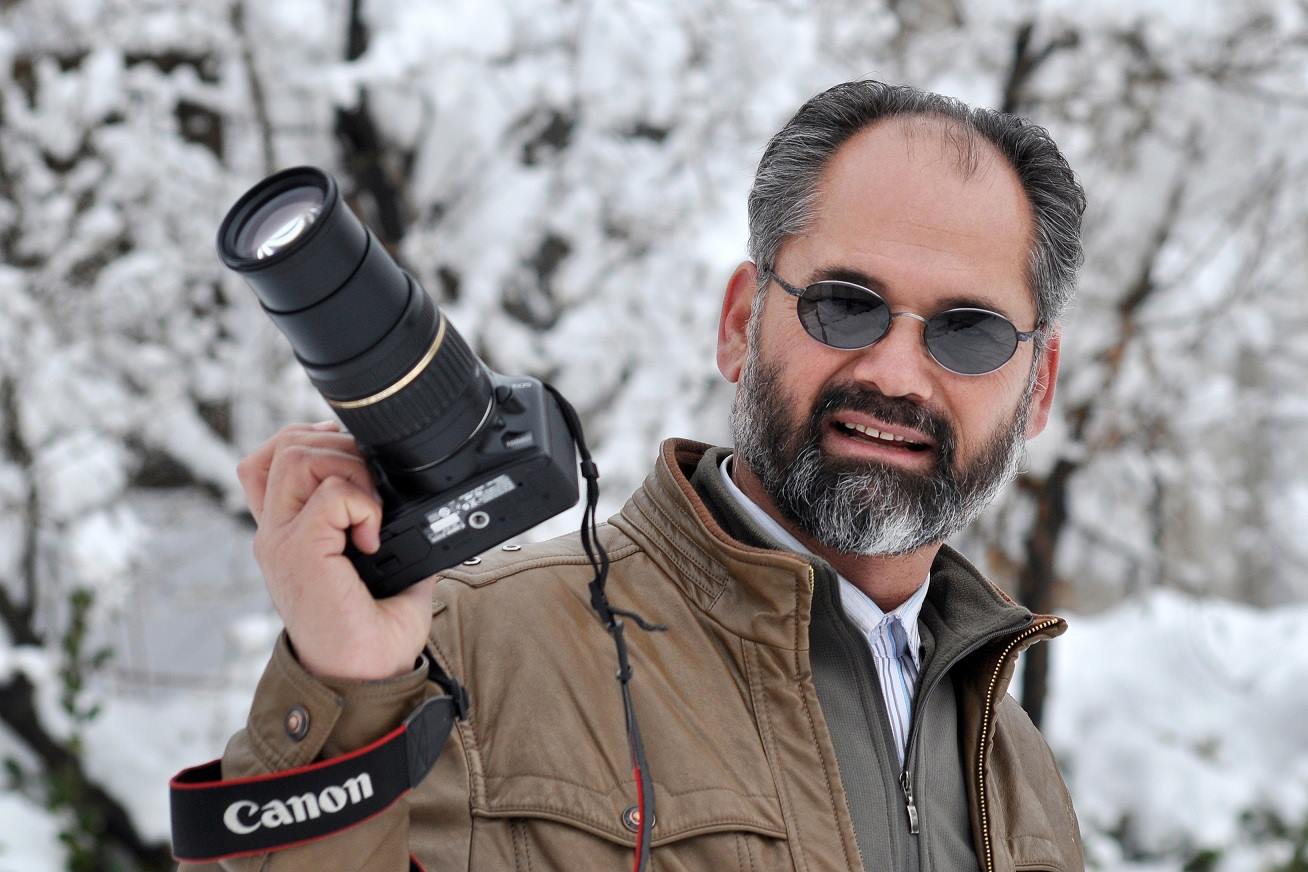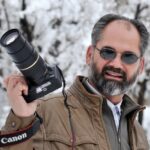Interview: Aziz Roish
Rewriting: Nemat Rahimi
Editor: Aziz Royesh
(This text is published after Ustad Musafir’s final editing and revision.)
Roysh: Greetings to all viewers of Sheesha Media. In this program, we have the honor of being joined by Ustad Musafir. Najibullah Musafir is not only a photographer but also a painter, artist, and cherished friend.
The life story of Ustad Musafir is incredibly fascinating – it reads like a captivating tale. Whenever I listen to his stories, it’s as though a moment in our people’s life comes vividly to life for me.
Today, we have invited Ustad Musafir to Sheesha Media to share his stories with us and better understand how he embarked on his lifelong journey. May we proceed, Ustad?
Musafir: Firstly, I would like to extend my greetings and respect to you and all the esteemed viewers of Sheesha Media. I am at your disposal and will do my best to answer any questions you may have.
The story of the white beard and hair
Roysh: Ustad, I notice that your hair and beard are both white. It’s true that you have traveled and are a Traveler (Musafir); but could you share with us why your hair turned white at such a young age?
Musafir: It is natural for human beings to change over time, but sometimes these changes occur prematurely, and at other times, they occur naturally. The truth is that from the time I was born and became aware of my left and right hands, I have experienced pain and suffering constantly – not just on a personal level but also on behalf of my country and fellow citizens.
Occasionally, moments of happiness have seeped into my life; however, the weight of my pain, suffering, and sorrow has been more significant and has profoundly impacted the premature whitening of my hair and beard. Although I have tried not to let my sorrows and misfortunes affect me, as you can see, they have still taken their toll.
Roysh: Ustad, it hasn’t been too long since we last met, and I remember your hair and beard being black. How did they turn white so suddenly in recent years? Also, may I ask your age and if it’s natural for your beard to be white as early?
Musafir: I was born in 1963-1342. I will be turning sixty years old next March. Our people used to say that “Shast wa Shekast”, meaning turning sixty, is synonymous with failure; and that one’s hair and beard will naturally turn white at this age.
Birthplace – the Quoli Abchakan
Roysh: Ustad, could you tell us about your birthplace and home? Who were your parents, and what was their social status? Our audience, which may be watching us from afar or reading this text, would be interested in learning more about your background.
Musafir: I was born into a family that was not particularly well-educated. My birthplace was in the heart of Kabul, in a locality called Quoli Abchakan in Deh Afghanan, located in the 2nd district of Kabul. It was approximately one and a half kilometers away from the Presidential Palace.
Unfortunately, my family was not well-educated. However, my father and his two brothers were able to purchase a house and settle in the area where I was born. When I was four, my father and uncles sold the house. My uncles moved to the Poli Sokhta area while my family settled in Qalai Shada, where I spent my childhood.
During my formative years, I attended Qalai Shada Elementary School, Mirwais Nikah Middle School, and Ghazi, which, back then, was named Shir Shah Suri High School. In 1361, I was due to graduate from school, but unfortunately, it did not come to fruition and was subsequently postponed for a few more years.
Royesh: Ustad, we can discuss school later. However, please share some information about your parents, such as their names, the number of siblings you have, and their current whereabouts.
Musafir: My father’s name was Mehrabuddin. When he was 12 or 13 years old and living in the Quoli Abchakan area of Deh Afghanan, the local children knew him by Mihrab Hazara. This was the name they used to call him. My mother’s name is Taban, and I have six sisters and three brothers.
Royesh: Could you please share where your brothers and sisters reside and what circumstances they have faced?
Musafir: My elder sister, by the name of Rona, passed away last year. May God grant her peace. My fourth sibling, Marzieh, was killed in 1368 in my second year of university. A day before the accident, Marzieh had lost her daughter. The following day, while the women were gathered at her house to offer their condolences and recite Fatiha, and the men were assembled in a separate room, a rocket launched from Paghman struck the wall of the room before hitting my sister in the back of her head, penetrating her brain.
Numerous rocket fragments struck my dear mother; may she rest in peace, causing severe injuries to her back. As a result of this tragic event, my sister was promptly transported to the hospital, but sadly, she succumbed to her injuries. Regrettably, her grief over losing her daughter the previous day weighed heavily upon her, inadvertently causing her to contribute to our sorrow.
Royesh: May God have mercy on them indeed. This incident is a profound tragedy that is highly challenging to recollect. As for your other sisters, where are they now?
Musafir: One of my sisters has been residing in Tajikistan for nearly four years with her husband and six children – two boys and four girls. Thankfully, their sponsorship process has been progressing smoothly, and they will arrive in Canada this month.
My sixth sister’s name is Hafizah. She has been residing in Australia for over twelve years, along with her two sons and two daughters. Her eldest son is named Mujtaba. Two years ago, my sister sent me two video clips that I found very intriguing. One of the clips featured my nephew, Mujtaba, who was around twenty-one years. It showcased his academic pursuits and included footage of him flying in educational planes.
During his flight, Mujtaba took a video capturing the experience. I found this fascinating, as in Afghanistan, those without connections or famous support often lack the opportunity to pursue higher education or become part of the air force. However, in Australia, immigrants have the freedom and resources to pursue their passions and achieve their full potential in any field they choose.
My third sister, Razia, currently resides in India. She is two years my junior and has four daughters and three sons. Her eldest daughter is in Chicago, USA, while her eldest son resides in Germany. Her other sons and daughters are under the care and supervision of the United Nations Refugee Agency in India and live with her there.
When I traveled to America to showcase the documentary movie about my life and work, I had the opportunity to meet my niece and her husband in Chicago after the screening. My niece’s husband is my cousin Rahmat, my Kaka Suhrab’s son. He is a kind and upstanding young man.
When I reached America, my daughter’s fiancé lived in Toronto, Canada. Around a week after I arrived in America, my daughter also came to Canada and contacted me. She urged me to visit her in Canada after my work in America ended. “You can return to Afghanistan”, she said, “if you desired”.
I told my uncle’s son, Rahmat, that, if possible, I would like to visit my daughter in Canada before returning to Afghanistan. Rahmat had spoken with an Afghan who provided him with a practical and lawful option. According to him, if a person has a first-degree family member in Canada, they may be able to make an official request to the police and secure an appointment.
As a result, I made an appointment and traveled from Chicago to New York. I was eager to visit Niagara Falls, which I had envisioned and read about many times. When I finally saw the falls, I was captivated by their beauty and grandeur. Since we had arrived late in the day and our scheduled meeting was the following day, we decided to spend the night near Niagara Falls. During our stay, I took as many pictures and videos of the falls as possible. The next day, when the formalities began, I crossed the border from America into Canada.
I had my camera bag, laptop, and several hard disks containing my treasured photos. As an artist and photographer, my photos are like my children to me, and I always keep them close at hand. In the same way, a writer cherishes their book or a painter treasures their painting like a child, the photos I had captured in various, and sometimes challenging, conditions were like my own children. It didn’t matter if some of the pictures were poorly lit or had a less-than-perfect composition as long as they told a meaningful story. I had saved all of them on my hard drive.
My photos were always close to me, as my camera and laptop never left my side, and my hard drives, containing hundreds of thousands of images, were always just a few centimeters away from my heart.
Roysh: Ustad, your command of language is admirable. You have a keen eye for detail and a deep appreciation for the beauty of nature. Your description of photos is truly stunning, showcasing your artistic vision and ability to capture the essence of everything around you. Your trip to Canada was a remarkable experience as you journeyed through breathtaking landscapes, spanning from the serene plains to the towering mountains and valleys. Undoubtedly, you have made unforgettable memories and captured stunning photos you will cherish forever.
Musafir: I was crossing the Kaman Bridge into Canada with my camera around my neck. I paused in the middle of the bridge, where the border between the United States and Canada lies, marked by flags representing both nations. In this precise location, I took a series of stunning photographs of Niagara Falls, capturing the magnificent natural wonder in all its splendor.
I journeyed to the Canadian border and presented myself to the authorities. The law enforcement officers were pleased with my compliance. My daughter and son-in-law eagerly awaited me on the opposite side of the border. It’s worth noting that my son-in-law goes by the name of Rahmatullah. Throughout this journey, my niece displayed remarkable graciousness and kindness. Furthermore, my Kaka Sohrab’s son worked tirelessly and accompanied me until the very end, until I safely crossed the Canadian border, at which point they returned to Chicago.
Roysh: Can you tell me more about your other sisters? Do you have any other siblings in Kabul?
Musafir: Certainly. I have an older sister named Fowzia, two years older than me. She resides in Kabul with her husband, two sons, and four daughters. Her sons and daughters are married. My sister has several grandchildren who also live in the city, just like many of our fellow citizens and loved ones currently facing harsh, challenging circumstances in Kabul.
Royesh: Could you please provide me with some details about your brothers? You mentioned having two brothers. Where are they currently located, and what do they do for a living?
Musafir: I am grateful that both of my brothers are still alive. One lives in Kabul, while the other resides in Islamabad, Pakistan. My brother in Kabul attended Military University and earned a degree in logistics while serving in the army during Babarak Carmel’s time. However, when the Mujahideen came to power, he left the military and focused on reading books.
Royesh: That’s interesting. What is your brother’s name who lives in Kabul?
Musafir: His name is Homayun Ershad.
Royesh: How old is your brother? Is he married, and if so, how many children does he have?
Musafir: Homayun is four years younger than me. He is married and has five children; three daughters and two sons. One of his daughters is already married, while another is studying engineering. The third daughter is also pursuing her studies. One of his sons lives in Kabul, while the other resides in Virginia, USA, with his aunt. He has been in the United States for over fifteen years.
After arriving in America, I visited my nephew for the first time after the film shows. Since we lived in the same place in Kabul, in my father’s mansion, my nephew was like one of my children. His aunt is also my uncle’s daughter and works as an engineer. They graciously showed me around during my stay with them and took great care of me. They knew of my appreciation for nature and beauty and took me to various sights. Although I am not overly concerned about my dietary needs, they were attentive to my meals and provided appropriate food.
For me, natural and artistic beauty must be preserved and maintained. Nothing brings me greater pleasure than observing a well-groomed and aesthetically pleasing environment. I delight in hearing beautiful sounds and music, which nourish me mentally and spiritually. Individuals must prioritize nourishing their bodies, stomachs, souls, and spirits. We must consider the importance of feeding our souls, as well as our physical bodies.
My nephew was well aware of my interests and passions. He made it a point to take me out to explore Virginia’s natural and picturesque landscapes whenever the weather was favorable. I took numerous photographs of the stunning scenery. Fortunately, another one of my uncle’s daughters resided nearby. As I mentioned previously, I have two uncles: Rostam and Sohrab. Rostam was my older uncle, and his younger brother, who was older than my father, was named Sohrab.



